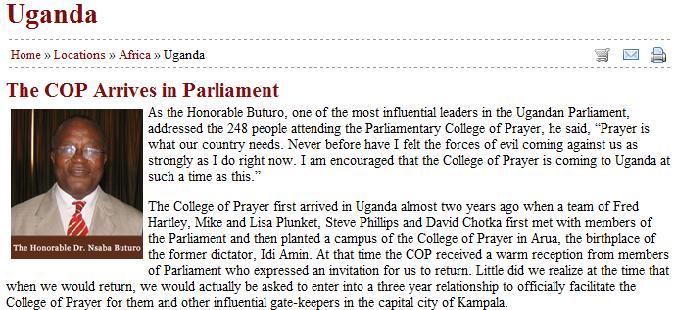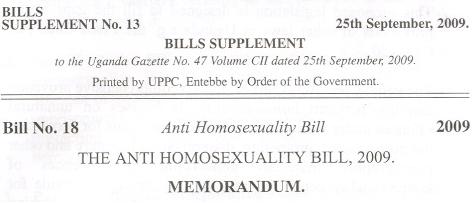Many observers have speculated about U.S. influence in Uganda, particularly relating to the Anti-Homosexuality Bill 2009. The obvious trigger for legislation this year was the ex-gay conference held in Kampala in March. Organized by Ugandan Stephen Langa, the conference featured presentations by Scott Lively, Caleb Brundidge and Don Schmierer. Lively and Brundidge addressed some members of the Ugandan parliament in a breakfast meeting on March 5. From minutes of the Ugandan Parliament:
THE SPEAKER: Thank you very much, hon. Minister. Hon. Members, this brings us to the end of today’s business.
Before we go, I have this communication to make. All Members are invited to an executive breakfast meeting seminar on the dangers of homosexuality. The theme is, “Exposing the truth about homosexuality and the homosexual agenda”. The meeting will take place in the Parliament Conference Hall tomorrow Thursday, 5th March starting at 7.30 a.m. to 9.00 a.m.
Guest speakers include Dr Scot Libley [sic – Scott Lively] of the United States, Caleb Lee [Brundidge] of the United States and Mr Stephen Langa of the Family Life Network. All Members are invited to attend and breakfast will be served. The House is adjourned until tomorrow at 2.30 p.m.
Lively’s collaboration with Stephen Langa goes back at least to 2002 when Lively traveled to Uganda twice. At the time, Lively sought to work with Campus Crusade for Christ but these plans fell through. He then turned to Stephen Langa who helped set up his trip.
I then called Stephen Langa, head of the Family Life Network and organizer of the highly successful conference against pornography and obscenity, at which I had spoken in March. He was enthusiastic, and offered to set up speaking events and media appearances on the anti-porn topic.
Lively also collaborated with Rev. Martin Ssempa during this visit.
Speaking of Ssempa, Rick Warren and Saddleback church have been raised as possible influences on the Anti-Homosexuality Bill due to a past connection with Ssempa; the Ugandan pastor collaborated with Saddleback until 2007. However, Rev. Warren recently made known his break with Ssempa via a statement to me on October 31. Ssempa recently commented on this break in an AFP news report.
Ssempa told AFP he was disappointed by a recent statement by American mega-Pastor Rick Warren, who delivered the convocation at US president Barack Obama’s Inauguration.
Warren did not mention the Anti-Homosexuality Bill specifically, but said he and his wife ended their relationship with Ssempa, “when we learned that his views and actions were in serious conflict with our own”.
Other American churches support Martin Ssempa (see here and here), but there is a more direct connection to the Ugandan Parliament. As noted in a New Vision report, an American organization called the College of Prayer was recently in Uganda to host prayer meetings and leadership training.
MEMBERS of Parliament have been warned against witchcraft and corrupt tendencies.
“You should not consult witchdoctors for success but instead seek help from God,” Dr. Fred Hartley, the president of the College of Prayer International, said.
“I know witchcraft is a big problem in Uganda but as MPs, you should be exemplary,” he said.
Hartley was speaking during a prayer meeting for parliamentarians at Fairway Hotel in Kampala on Tuesday….
After the prayer meeting, eight MPs were selected to be in the servant leadership team for Parliament for three years.
They included Ruth Tuma, Alice Alaso, Beatrice Lagada, Moses Ntahobari, Capt. Grace Kyomugisha, Benson Obua, David Bahati and the East African legislative assembly MP, Maj. Gen Mugisha Muntu.
On the website of the College of Prayer, one learns that this meeting was a part of a longer term relationship (this link does not work now, here is a screen capture of it.
The College of Prayer will have it’s first module in the Parliament of Uganda from October 31-November 1. Two members of Parliament were able to attend the African Summit this summer and will be encouraging their fellow members to attend. Fred Hartley and Mike and Lisa Plunket will be facilitating this module on “Lord, Teach Us to Pray.”
Following this COP there will be COP’s in the cities of Kampala and Gulu taking place November 2-4. Fred will be leading the one in Kampala for leading Pastors and Mike Plunket will be leading the one in Gulu. Mike will be graduating 1000 students who have completed three years of COP training. Continue to pray for God’s protection over the members of Parliament and their families, particularly for Honorable Bensen, Honorable David and Honorable Buturo. Pray as well for all the pastors and Christian leaders who will be attending each of these modules. Pray for the manifest presence of Christ to be in the midst of these meetings and for the Holy Spirit to guide each of their sessions.
The two named sponsors of the Anti-Homosexuality Bill 2009 in the Parliament are David Bahati and Benson Obua-Ogwal. In the executive branch, the prime voice has been Nsaba Butoro. Note that the College of Prayer specifically mentions these men for recognition. This recent Ugandan visit followed a meeting in April which was described on the College of Prayer website:

Note that the College of Prayer has entered into a three year agreement to “facilitate the College of Prayer” for Parliament. In February, 2010, another bill supporter, Apostle Julius Oyet will speak at a Leadership Training meeting in Atlanta at the Lilburn Alliance Church, a church affiliated with the Christian & Missionary Alliance and pastored by Fred Hartley, the president of the College of Prayer. MP Benson Obua is one of those featured on the page who recommend the event.
Rev. Oyet was present with Rev. Ssempa and Rev. Langa when the first motion was made to allow introduction of the Anti-Homosexuality Bill back in April.
Let us hear from hon. Bahati. In connection with the motion he is moving, we have in the gallery Apostle Julius Peter Oyet, Vice-President of the Born Again Federation; Pastor Dr Martin Sempa of the Family Policy Centre; Stephen Langa, Family Life Network; hon. Godfrey Nyakaana; the Mayor of Kampala City Council.
This American organization has the closest contact with those responsible for the Anti-Homosexuality Bill of any I have been able to discover. Over the past several days, I have talked a couple of times to College of Prayer president Fred Hartley to inquire about the relationship between his organization and the Ugandan legislators.
Rev. Hartley wanted to make it clear that he and the College of Prayer are not politically motivated. Hartley told me that they are in Uganda to lead the Parliament and other leaders in “Christian discipleship.” Because of that focus, Hartley told me that he “can’t take responsibility for their decisions.”
Regarding the co-sponsors of the Anti-Homosexuality Bill, David Bahati and Benson Obua and the Minister of Ethics and Integrity, Nsaba Buturo, Rev. Hartley had only good to say. He told me that they are “men of integrity” who “want to do what is right.”
Regarding the Anti-Homosexuality Bill, Rev. Hartley told me that he has a hard copy of the bill he received in July from David Bahati. He declined to send me a copy because he said that Bahati told him that such copies were unauthorized. Rev. Hartley acknowledged that the copy he has seen is different than the copy of the bill I sent to him (I sent a copy I was given by Martin Ssempa). Rev. Hartley believes that I may be laboring under a false idea of what the bill actually says. Hartley told me that David Bahati told him last week that many accounts of what is actually in the bill are “grossly distorted.”
While Rev. Hartley believes that the copy of the Anti-Homosexuality Bill I have is incorrect, I must differ. Here is a copy that was published by the Uganda Gazette.

I was sent a copy by Martin Ssempa that was compiled just before it went to the Uganda Gazette. They are the essentially the same which was confirmed to me by an individual in Uganda who would be in a position to know. Once a bill is published in the Uganda Gazette (the official publication for all legislation), it is available for public discussion and review.
At present, it seems that Rev. Hartley believes that the bill is not as bad as critics say it is. He is working with the impression that the current bill is not an accurate version and believes his friends Bahati, Buturo and Obua. I am unable to reconcile these conflicting claims. Clearly, I have evidence that the bill I have seen as confirmed is accurate and has been published by the Uganda Gazette .
It remains to be seen what Rev. Hartley and the College of Prayer will do when they discover that the bill in Parliament is what critics say it is. My hope is that they will use their influence for good. Time is of the essence. According to Rev. Hartley, Bahati and company want the bill voted on by the end of 2009.
For a bill to become law in Uganda, it must be read in the Parliament three times before a vote. The tabling of a bill must be approved first by Parliament before it is published and read. This happened on April 29, 2009. The bill was printed in the Uganda Gazette on September 25, and was first read on October 14. It was then referred to committee and will soon have a second reading. At least 14 days must pass until the third reading a vote.
See this link for the Parliamentary discussion of the Anti-Homosexuality Bill when the “Motion for a Resolution of Parliament to present a Private Members Bill” was made. At that time, David Bahati won the opportunity from Parliament to introduce the bill.

